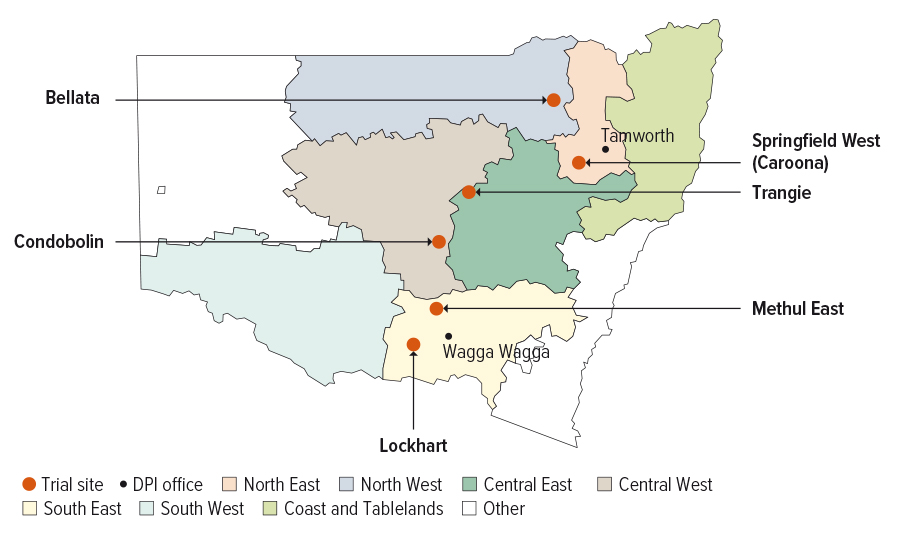Researchers are assessing the effectiveness of a suite of next-generation soil technologies (NGSTs) for tackling soil constraints and increasing crop yields.
Led by the New South Wales Department of Primary Industries (DPI), the $36 million GRDC–NSW DPI Unlocking Soil Potential Strategic Partnership will span six trial sites across the state over the next four years.
Researchers will deploy four types of novel amendments to tackle various soil limitations at Lockhart, Methul, Condobolin, Trangie, Caroona and Bellata (Figure 1).
Figure 1: Field trial locations

Source: NSW Department of Primary Industries.
The constraints of interest include hard-setting soils, surface crusting, alkaline dispersive topsoils and subsoils, slaking, sodic soils, and surface and subsurface acidity.
Amendment types
The novel ameliorants include chemically balanced organic amendments (NGST1), engineered carbon-based composites (NGST2), nano-structured lime and gypsum delivered in liquid and solid forms (NGST3), and novel technologies to build soil organic carbon (NGST4).
Dr Lukas Van Zwieten, senior principal research scientist at NSW DPI, says the research aims to reduce the annual $800 million loss attributed to soil constraints in NSW.
With about 95 per cent of NSW soils affected by multiple constraints, he says the potential impact on growers’ productivity and profit is significant.
“If we can create a step change in productivity, expand the range of crops that can be grown and increase the amount of carbon in the soil, it opens up many economic opportunities,” Dr Van Zwieten says.
Traditional ameliorants
As well as novel amendments developed by Dr Van Zwieten with the University of Newcastle’s Professor Ajayan Vinu and the University of Adelaide’s Dr Ehsan Tavakkoli, traditional ameliorants such as superfine lime and gypsum will be part of the study.
Among the novel treatments to be deployed is nano-lime, which is applied to the soil as liquids or solids to address the slow reaction time and limited mobility of traditional lime amendments – potentially eliminating the need for tillage incorporation.
The research team is also engineering pelletised carbon-coated minerals to address multiple soil constraints. The aim is to promote root exploration of the soil profile to better access stored water and nutrients.
Dr Van Zwieten says the project is working with industry partners to facilitate the commercialisation of the most promising amendments.
Controlled studies
The research will include paddock-based trials and glasshouse experiments using advanced techniques, including stable isotope methodology and computer tomography imaging of soil with living plants.
Dr Van Zwieten says these will complement the field studies by delivering a mechanistic understanding of how these novel amendments work in soil over time.
Also under investigation is the influence of soil biology, particularly fungal hyphae and hyphal products, in creating better-structured soil and improving root growth.
Paddock trials
A dedicated agronomy team will evaluate the performance of all amendments under paddock conditions. An extensive research team has been assembled to facilitate delivery across NSW.
The team includes research agronomist Rick Graham and soils research officer Murray Hart (Lockhart and Methul), research agronomist Richard Maccallum (Condobolin), research and development agronomist Leigh Jenkins (Trangie) and research officer Tendo Mukasa Mugerwa (Caroona and Bellata). Research officer (microbiology) Ashlea Webster will help run soil biology experiments.
NSW DPI economists will evaluate the value proposition of each amendment.
More information: Dr Lukas Van Zwieten, lukas.van.zwieten@dpi.nsw.gov.au

























































